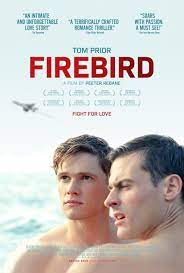
FIREBIRD
Estonia/UK, 2021, 107 minutes, Colour.
Tom Prior, Oleg Zagorodnii, Diana Pozharskaya, Jake Henderson, Nicholas Woodeson, Margus Prangel.
Directed by Peeter Rebane.
We do not see many films from Estonia. And we do not see many stories from Estonia during the Soviet occupation, especially at an Army base in 1977. But, this is the initial setting. And it is the story of a young soldier, Sir gay (British actor, Tom Prior, who co-wrote the film and acted as a producer) is nearing the end of his service, hounded by an exaggerated shouting Sergeant Major in the barracks, doing driving jobs, bonding with his friends, a keen photographer, especially as Luisa who works in the Major’s office.
But, of set purpose, this is a film about homosexual relationships. At the end of the film, there is information about legislation in Soviet times, about positive changes in 1993 but, a warning, that more restrictive legislation and suspicions were introduced in Putin’s Russia in 2013. There is a website information for audience response to the issues.
In many ways, audiences nowadays are familiar with this story and so have to travel back to try to appreciate what relationships and secrecy were like in those times.
Tom Prior is convincing as Sergey, developing his character over the six years of the film’s narrative, naive soldier, acknowledging his sexual orientation, the relationship with the pilot, Roman, his move to Moscow to audition to be an actor, his success, the impact of Roman’s marriage to Luisa – and then four years passing, Roman and Luisa with their young son, Sergey successful in Moscow – and the build up then to an emotional climax.
In the synopsis, Roman is described as “charismatic”. That seems to be something of an overstatement. In fact, the actor, Ukrainian Oleg Zagorodnii. With the touch of the iconically handsome, is, nevertheless, somewhat stolid in his screen presence and performance. On the other hand, Luisa is a much more open personality.
There are three significant military characters in the background, Sergey has a young friend at the base who is hostile to the relationship, a Major, sinister in that Soviet official way, suspicious of Roman, confronting him, asking Sergey to spy on him. He also appears at the wedding, confronting the couple. And, at the very end of the credits when most of the audience have acted on their compulsion to exit instantly, there is a momentary glimpse of the Major, a reminder of continuing sinister surveillance. But, there is also a sympathetic official, played by Nicholas Woodeson, familiar from many British films, who reveals that he has always known what was happening but did not let that influence his decision-making.
There are two sequences from Stravinsky’s, Firebird, symbolic – but, perhaps, not for those unfamiliar with the ballet.
A contribution to dramatising the realities and emotions of same-sex relationships and a reminder of past (and present) repressions.
- The title? References to Stravinsky’s Firebird, performance sequences, the end? Themes and symbols?
- Estonia, 1977, Moscow 1978, Moscow during the 1980s? The military base, the meagre apartments, drama school in Moscow, theatre and performance, more lavish apartments? Military action, flights, difficulties? The musical score?
- The film highlighting homosexual relationships, legislation in Soviet times, Soviet-occupied countries, change of legislation in the 1990s, imposition of stricter regulations in 2013? The attitude of Putin’s Russia? The appeal for freedom, the information at the end, the website for affirmation? And the sinister final image after all the credits and the presence of the major with his suspicions?
- A true story, based on Sergey’s memoir, 1996, A Tale about Roman?
- Sergey’s story, in the military, away from home, the possibility of returning home after service, yet his ambitions to be an actor? His tasks, driving? Barracks’s life, strictness, the shouting Sergeant Major? His range of friends? His friendship with Luisa? His love of photography, outings with his friends, with Luisa?
- The arrival of Roman, his status as a pilot, presentable? Sergey driving him? The attraction? Their being together, discussions, Roman making the approach, the kiss? The effect on Sergey? Finding the time to be together, the sexual encounter and its effect? The major arriving, already expressing his suspicions to both Roman and Sergey? His receiving the report, interrogating Sergey and asking him to spy on Roman? The search of the apartment, Sergey hiding under the photographic equipment? The next day, Roman’s sternness and rejection of him?
- Sergey, going to Moscow, Luisa and her attitude? The audition, finding friends, the performances?
- The invitation to the wedding, Roman and Luisa, Luisa explaining to Sergey? At the wedding, his being upset, the conversation with Roman, the major coming out and confronting them?
- Four years passing, Sergey and his life in Moscow, performance, achievement, the drama teacher, the lessons, miming?
- Roman coming to Moscow, the tensions with his wife, but his love for his son? Coming to the theatre, Sergey and his reaction? Roman offering the apartment, making it their home, lavish? The celebration, the friends all present? The friends seeing Roman and Sergey together, his disgust, leaving, revelations was he who put in the initial report to the major?
- Roman and Sergey together, the lyrical scenes, at the beach, the water? Sergey’s fear that Roman had drowned?
- Roman leaving, the letter, Sergey away, receiving the letter, phoning, the discovery that Roman had gone to Afghanistan, his death?
- Visiting Luisa, the boy, the tensions, the bonding between Luisa and Sergey despite their experiences?
- The crusading aspect of making the film and its release, the final information, the website?
- And the impact of the brief glimpse of the Major, the reminder of sinister surveillance even in contemporary times in Russia?